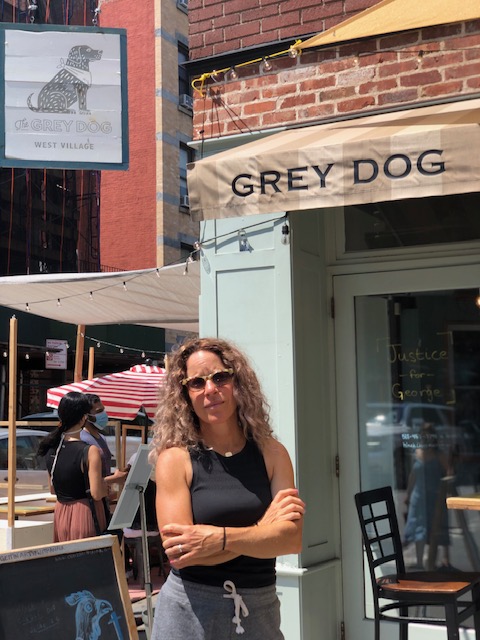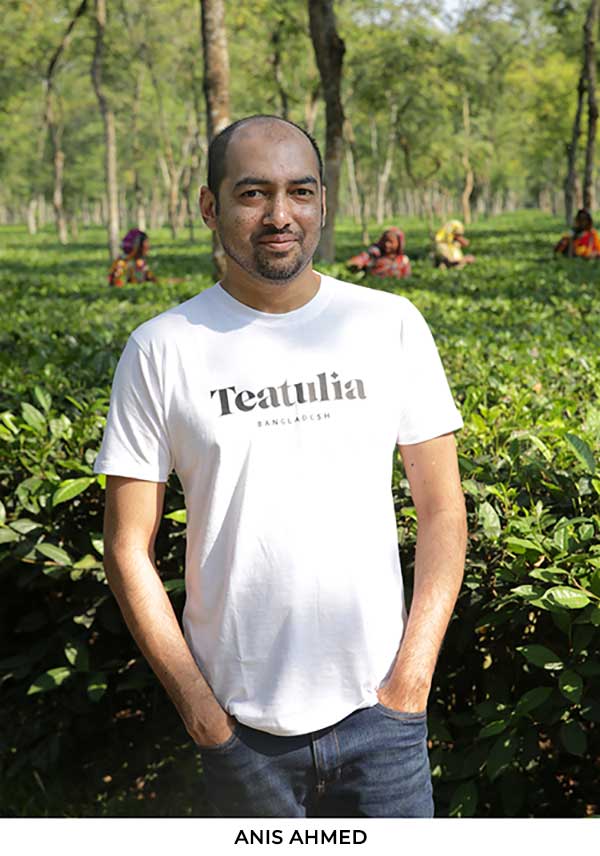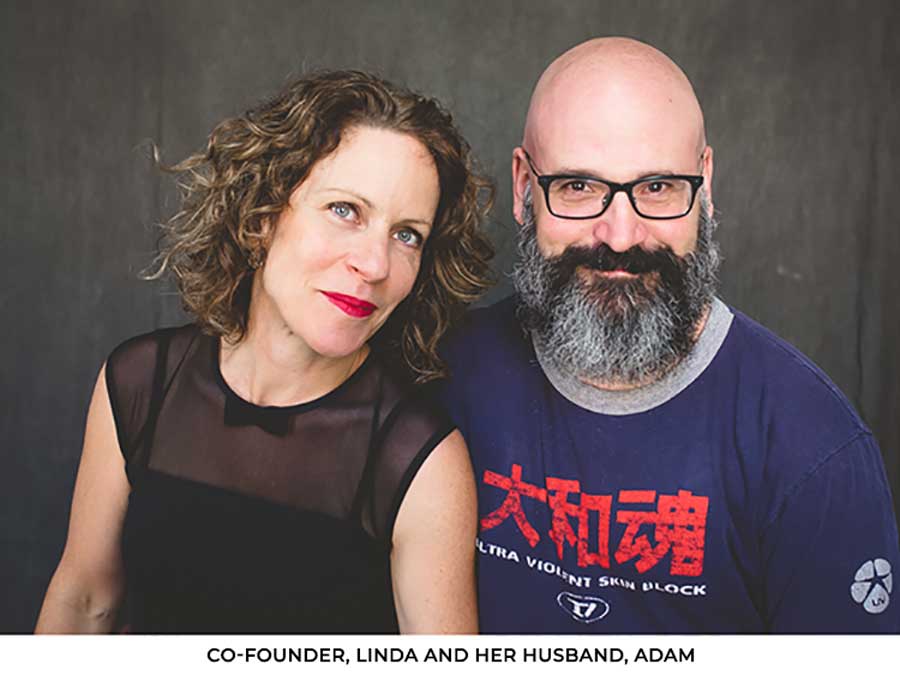Founder's Friday: How They Met
Posted by Teatulia on 8-7-2020
Teatulia was born in Bangladesh, made in Denver, but did you know our beginnings all started when two strangers met over a celebrity sighting in a New York coffee shop? Here's the full story from an interview between our Associate Marketing Manager, Elsa, and our Co-Founder, Linda.
"Garden to cup, organic, sustainable, vertically integrated supply chain, we were already doing it. We were actually leading the curve. The more data points I got I realized that Teatulia was maybe even more than on trend, we were very much ahead of trend and that this was an idea that definitely an idea that could go somewhere.
Elsa
Hi everyone! My name is Elsa Meyners, I’m on the line with Linda Appel Lipsius, our founder of Teatulia. I’ll let her introduce herself. Take it away, Linda.
Linda
Hey, yes I’m Linda Appel Lipsius the founder of Teatulia. Happy to be here.
Elsa
So Linda, I was wondering if you could speak to a little bit about how Teatulia came to be.
Linda
Yeah, so kind of a funny story. So Teatulia came about, because my husband and I were friends with this guy, Anis Ahmed. He’s a Bangladeshi guy who happened to be getting his PhD in English Literature from NYU. He met my husband, Adam. They met in a coffee shop called Grey Dogs. They had been both going to the same coffee shop for a number of days. Adam was writing the great American novel, Anis was writing the great Bangladeshi novel. They were both writers but hadn’t talked to each other. Then one day Monica Lewinsky walks in, and that broke the ice. They finally decided they had to talk about it and had to process who they’d seen. They’re kind of the same people, they’re both super smart, kinda nerdy guys and they hit it off right away.

So, Anis came into our lives along the way, and we were really just buddies with him. Anis was staying with us in Los Angeles and was telling us how the garden was progressing. They were interested in looking at the US market as an export market for the teas. At that point I had been working with my family’s business, Orange Glow, and we were selling the business so I knew I was going to have some time on my hands. I offered Anis to do a business plan and do a market analysis. So that’s how it really got started. And that was probably about 14 years ago really offering to help and not necessarily anticipating being with it fourteen years. But the more I learned about the businesses and the more I learned about the garden and the model, the more I realized that we really had something unique to bring to the market.
Elsa
So after you met Anis and you were introduced, you put together this market analysis for Teatulia, at one point did you decide to really run with it?
Linda
Yeah I mean honestly, It happened pretty incrementally. So at first I was focused externally, focusing on the market, what the opportunities were. Initially we actually were really thinking of going after tea shops, which we pivoted for a number of reasons. They really weren’t receptive to the idea of a new origin tea and the opportunity actually just wasn’t that big. So we pivoted to CPG (consumer packaged goods) and packaged tea because the size of the prize was much bigger, but the challenge remained how to stand out in a crowded, relatively low interest category. So we eventually understood that the story was something unique, and if we could really tell the story we could really set ourselves apart. Also with unique packaging, we could stand apart. So I really initially just focused on the external market. Honestly, until my husband went over there; He went over there to shoot a video for the website. When he was there he was sort of able to tease out both through video and his own experience how different this was. Actually how unique this regenerative tea garden that was built on the permaculture, sustainability principles was in the scheme of things. That then coupled with going to some tea conferences while listening to a lecture and everything single thing that Teatulia represented. Garden to cup, organic, sustainable, vertically integrated supply chain, we were already doing it. We were actually leading the curve. The more data points I got I realized that Teatulia was maybe even more than on trend, we were very much ahead of trend and that this was an idea that definitely an idea that could go somewhere.

Elsa
I had no idea Adam was the mediator between the whole relationship.
Linda
Yeah, he really kinda was.
Elsa
Thanks to Adam. I was also wondering if you could highlight your favorite piece of our sustainable culture or vertically integrated. Like out of what you’ve seen in the garden and how we do things, what’s the piece you like to highlight the most?
Linda
I think, honestly, just the simplicity of it. I remember the first time I went to the garden and just driving around, being just continually blown away by what the garden is and being like "wow this is really revolutionary, and this is next level, progressive thinking." And all of a sudden I was like "wait, this actually isn’t." This is how it’s supposed to be. In the last hundred years, 100-150 years, this ‘gee whiz science’ has come in and interfered with the right way to do things, and our connection to the land and mother nature, and her wisdom. We’ve screwed it up. We’ve short circuited the entire natural system and what the garden has done has really gone back and trusted that the earth and the natural cycles, they’ve done it for million years, nobody needed humans to come along to help. It’s the simplicity of it that I find so spectacular. We tend to just really complicate things. And the other thing is the healing nature of what we do, at every step of the way. You go over to the garden and you see this land that is just destroyed and just utterly devoid of life through human interaction through rock lifting and through the organic farming method, through regenerative farming, you can literally heal the planet. And then that trickles down to the people who are working the land because there’s more oxygen it’s a more vital system and it trickles further down the supply chain and the people are enjoying the tea because the product is clean the product is richer in nutrients than conventionally grown tea or produce or anything. And then just the over all minimal footprint and the fact that this is actually giving back and restoring. So a Couple of things. This is such an elegant system, such an elegant story and I look forward to getting more land and having more impact and reversing environmental degradation, one acre at a time as we go.

Elsa
That’s really cool. It’s funny I was thinking just today about in regards to movement and work and reading about the effects of sitting all day. It is just so simple, there are all these gadgets to undo this, but really the simplest thing to do it move and go for a walk.
Parallel to how we treat the earth. We come up with all these ways to do it but really all you need to do is let nature do its thing.
Linda
So much of it is because you can’t make money on walking. Nobody can charge you to go walk around your block. Did you read The Omnivore’s Dilemma?
"...agriculture has gotten so f’d up is because you can make more money the further you take an ingredient, or product or vegetable away from just what it is."
Elsa
No, I haven’t.
Linda
Please read it. It’s literally a life changing bible for me. One of the many millions of lessons in it is that agriculture has gotten so f’d up is because you can make more money the further you take an ingredient, or product or vegetable away from just what it is. You know corn, if you’re selling an ear of corn you can make 2 cents. If you’re selling the same amount of high fructose corn syrup you can get $100 for a liter or something. So we’re just committed to transforming and bastardizing those natural things and then in the process the benefits get lost and people get hurt. It’s very unfortunate. That’s one of the things I’m hoping with COVID is that we go sort of backwards.
So no one is going to be able to afford the gadgets anyways? Can we just do away with them.
Elsa
Really stripping back the things that you actually need in your life and you’re spending 8 hours at your house a day, how much of this junk isn’t necessary?
Linda
Yup, almost all of it.

